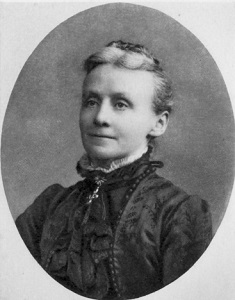De Engelse dichteres en schrijfster Matilda Betham-Edwards werd geboren op 4 maart 1836, Westerfield, Ipswich als vierde dochter van een boer, Edward Edwards en zijn vrouw Barbara. Zij volgde een opleiding in Ipswich en als gouvernante-leerlinge op een school in Londen. Haar eerste roman, “The White House by the Sea” (1857), was een onmiddellijk succes, werd meerdere malen herdrukt, geplagieerd in de Verenigde Staten en bleef gedurende veertig jaar in druk verschijnen. Matilda studeerde Frans en Duits in het buitenland en vestigde zich vervolgens met haar zuster in Suffolk om de boerderij te runnen die haar vader had toebehoord. Omdat ze meer wilde zijn dan alleen maar boerin, droeg ze van tijd tot tijd bij aan Household Words. Daarbij had zij het voordeel dat zij ondertussen bevriend was geraakt met Charles Dickens en al vroeg omgang had met Charles en Mary Lamb, vrienden van haar moeder. Na de dood van haar zus verhuisde ze naar Londen en schreef een aantal romans over het Franse leven op basis van haar frequente bezoeken aan Frankrijk en haar grondige kennis van provinciale Franse huizen, maar ook kinderboeken en non-fictieboeken over Frankrijk. Zij verbleef in Algerije met de feministische pedagoog Barbara Bodichon en bezocht met haar Frankrijk en Spanje. Wegens haar hugenootse afkomst beschouwde ze Frankrijk als haar tweede geboorteland en maakte het tot haar missie om een beter begrip en sympathie tot stand te brengen tussen de twee landen. Op deze manier heeft ze veel gedaan om een beter begrip tussen Engelsen en Fransen te bevorderen. Betham-Edwards wordt vaak genoemd in bloemlezingen van lesbische poëzie, maar er is geen sterk bewijs dat ze lesbische neigingen had.
Uit: The White House by the Sea
“IT was dismal enough ; dreary within, dusky without—with the gathering shadows of autumn twilight—and the gloom and the silence weighed upon my spirits. There was too much appearance of day to have candles, and though cold. and cheerless too early in the season for economical people to have fires ; so there was nothing for me to do but to look out of the window and listen to the eternal surging of the sea. I never grew tired of that, but I wearied of being alone. My father dozed uncomfortably in his chair, and only spoke now and then, to ask what o’clock it was, or to complain about something or other in the way that nervously affected people always do, and I could hear Ellice’s voice in cheerful conversation to the cat in the kitchen. Oh, if my father would but talk so cheerfully to me I
“Chatty ? ”
” Yes, papa.”
” Did you say it was a quarter to six, or a quarter past six, when you looked at the clock just now ? ”
” To six.”
” Are you sure ? ”
” Yes, quite, father dear.”
He gave a muttered ejaculation of discontent, and said no more. I thought ho had fallen asleep, but in less than five minutes he exclaimed querulously—” You must have made a mistake, Chatty, or it would have struck six by now; go and look, there’s a dear.” I lingered in the kitchen as long as I could, feeling loath to tell him that I was right, and when I returned he had dropped into a light but sound slumber. I took my old place by the window, and went on thinking. I ought rather to say imagining, for in the monotony of my daily life I had very little to think about, and if it had not been for the enthusiasm and extreme impetuosity of my temperament, I should have been dull indeed. As it was, I could not help wishing at times for some good fairy’s wand to make real and living the bright pictures and dreams that my mind so revelled in. But to-day my thoughts were not entirely of a visionary nature. It was a very slight thing ; a gossamer thread—a spider’s chain were stronger even, and yet it had bound down my fancy to a substantial and tangible existence. Pleasure parties in skiffs, painted boats and light flying yachts innumerable had passed and repassed all the summer long by our dark rock, and I, perhaps, just raised my eyes for one glance, and thought of them no more. Autumn has come now ; the south wind blew soft and warm still at mid-day, but there was a treacherous look in the sun’s bright rising, and every evening came with an uneasy war of the waves and a falling of rain : therefore summer visitors and gay holiday makers deserted us, and I could no longer sit on the sandy heath and be idle. But hardly four hours ago. in suite of the misty cloud and air, I had seen a boat dance by, swift and joyous as though on wings, and it had come near, very near to the little rugged stone on which I stood. So near that I could distinctly see the faces of those who were in it, and hear the gay echo and laugh of their merry voices. And somehow they dwelt on my memory.”

Matilda Betham-Edwards (4 maart 1836 – 4 januari 1919)
